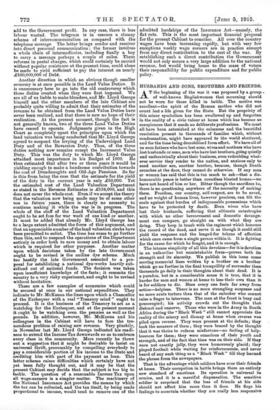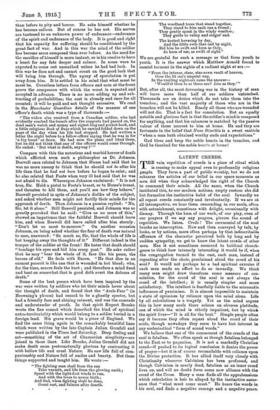HUSBANDS AND SONS, BROTHERS AND FRIENDS.
AT the beginning of the war it was proposed by a group. of well-known Englishwomen that mourning should not be worn for those killed in battle. The motive was excellent—the spirit of the Roman mother who did not count lost a life given for the State. But the propriety of this minor symbolism has been swallowed up and forgotten in the reality of a civic valour at home which has become so conspicuous that it needs no deliberate professions. We most all have been astonished at the calmness and the beautiful resolution present in thousands of families which, without condemnation, might have appeared 63 the world shattered, and for the time being demobilized from effort. We have all of us seen fathers who have lost sons, wives and mothers who have lost husbands or sons, men who. have lost brothers, going quietly and untheatrically about their business, even redoubling what- ever service they render to the nation, and anxious only to send another son, another brother, because, though Death crouches at the door, they cannot do otherwise. If any man or woman has said that this is too much to ask—that a dis- honourable peace is better than countless blasted homes—we have not heard of him or her. Bitter though the sacrifices be, there is no questioning anywhere of the necessity of making them. Freedom, our country, self-respect, are to be saved, and no weight of human lives, however precious, can tilt the scale against that burden of indispensable possessions which have to be protected by death. Even wives who have lost their husbands, suffering that ultimate catastrophe with which no other bereavement and domestic derange- ment can compare, go straight an with what they are doing, They keep in touch with the regiment which honours the record of the dead, and serve it as though it could still yield the response and the longed-for tokens of affection which once came from a single person within it. It is fighting for the cause for which he fought, and it. is enough.
The intense simplicity of all this devotion—for it is devotion in an unfamiliar but unmistakable form—proves both its strength and its sincerity. We publish in this issue some moving memorial lines written by a brother on a brother which go no further in the final tranquillity of surrender than thousands go daily in their thoughts about their dead. It is a paradox, but in a considerable sense it is true, that it is harder for men and women at home to lose their own than it is for soldiers to die. Here every one feels far away from action—helpless. There is no more strangling suspense and no more acute torture than that of the onlooker who cannot raise a finger to intervene. The man at the front is busy and preoccupied; his activity crowds out the thoughts that distract and unnerve. Those who were in the Army in South Africa during the "Black Week" still cannot appreciate the reality of the misery and dismay at home when reverse was piled upon reverse. They were present at the defeats; they took the measure of them ; they were braced by the thought that it was theirs to redeem misfortune—no feeling of help- lessness for them ; they were conscious of their youth and strength, and of the fact that time was on their aide. If they were not exactly jolly, they were humorously placid; they played football while waiting for reinforcements, and never heard of any snob thing as a "Black Week" till they learned the phrase from the newspapers.
That is the advantage which soldiers have over their friends at home. Their occupation in battle brings them an entirely new standard of emotions. Its operation is universal in armies, and it is a merciful dispensation. The sensitive soldier is surprised that the loss of friends at his side should not affect him more than it does. He flogs his feelings to ascertain whether they are really less responsive
than before to pity and horror. He asks himself whether he has become callous. But of course he has not. His nerves are tautened to an unknown power of endurance—endurance of the spirit and endurance of the body. It is good and right that his capacity for suffering should be conditioned by the great fact of war. And in this war the mind of the soldier has become more composed than ever before. As the need for the sacrifice of himself is more instant, so is his resolve to have a heart for any fate deeper and calmer. In some wars he expected to come out unscathed unless he had bad luck. In this war he does not and cannot count on the good luck that will bring him through. The agony of speculation is put away from him. It is settled in his mind that what must be must be. Countless letters from officers and men at the front prove the composure with which the worst is expected and accepted in advance. There is no more adding up and sub- tracting of probabilities; the cost is already and once for all counted; it will be paid and not thought excessive. We read in the Manchester Guardian details of the manner of one officer's death which was a type of thousands :—
" The widow also received from a Canadian soldier, who had evidently reached the trench after the supports had passed on, the dead man's watch and money and signet ring and pocket-book, and a little religions Book of Days which he carried folded down on the page of the day when his life had stopped. He had written a letter the night before to a fellow-officer saying that he was in for `a big boost ' at dawn. He had seen the plans and liked them, but he did not think that any of the officers would come through. lie ended; But what is death, anyway?" " Compare with this the notorious and morbid horror of death which afflicted even such a philosopher as Dr. Johnson. Boswell once related to Johnson that Hume had said that he was no more uneasy to think that he should not be after his life than that he had not been before he began to exist; and he also related that Foote when very ill had said that he was not afraid to die. Whereupon Johnson exclaimed: "It is not true, Sir. Hold a pistol to Foote's breast, or to Home's breast, and threaten to kill them, and you'll see how they behave." Bowmen persisted in spite of Johnson's dislike of the subject, and asked whether men might not fortify their minds for the approach of death. Then Johnson in a passion replied: "No, Sir, let it alone." Still Boswell persisted, and Johnson was no greatly provoked that he said: "Give us no more of this," showed an impatience that the faithful Boswell should leave him, and when Boswell did leave called after him sternly "Don't let us meet to-morrow." On another occasion Johnson, on being asked whether the fear of death was natural to men, answered: "tin much so, Sir, that the whole of life in but keeping away the thoughts of it." Different indeed is the temper of the soldier at the front! He hates that death should "bandage hie eyes and bid him creep past." He asks rather that he may "bear the whole of it, fare like his peers, the heroes of old." He feels with Bacon. "He that dies in an earnest pursuit is like one that is wounded in hot blood; who, for the time, scarce feels the hurt ; and therefore a mind fixed and bent on somewhat that is good doth avert the dolours of death."
Some of the best poems which have been inspired by the war were written by soldiers who let their minds hover about the thought of death, and found that the " Arch-Fear" (in Browning's phrase) had ceased to be a ghastly spectre, but had a friendly face and shining raiment, and was the comrade and nnderstander of youth. In that spirit Rupert Brooke wrote the fine sonnet which described the kind of spiritual extra-territoriality which would belong to a soldier buried in a foreign land. His grave would be a piece of England. We find the same thing again in the remarkably beautiful lines which were written by the late Captain Julian Grenfell and were published in the Times last Saturday. Deep feeling and art—something of the art of Chaucerian simplicity—are joined in these lines. Like Brooke, Julian Grenfell did not make death seem preternaturally glorious by contrasting it with hollow life and cruel Nature. He saw life full of cont. panionship and Nature full of smiles and beauty. But these things supported and taught him. He wrote
The fighting man shall from the sun Take warmth, and life from the glowing earth ; Speed with the light-foot winds to run, And with the trees to newer birth ; And find, when lighting shall be done, Great rest, and fulness after dearth. The woodland trees that stand together, They stand to him each one a friend ; They gently speak in the windy weather ;
They guide to valley and ridges' end. The kestrel hovering by day,
And the little owls that call by night, Bid him be swift and keen as they, As keen of ear, as swift of sight."
We are grateful for such a message as that from youth to youth. It is the answer which Matthew Arnold found to mental torment in the sights of a radiant night at sea :—
" From the intense, clear, star-sown vault of heaven, Over the lit sea's unquiet way,
In the rustling night-air came the answer-
Would'st thou boss these axe ? Live as they:"
But, after all, the most devouring war in the history of man will leave more than half of our soldiers untouched. Thousands are on duties which do not take them into the trenches ; and the vast majority of those who are in the trenches will not be killed. Nearly all those who are wounded will not die. That is a fact for consolation. But an equally notable and glorious fact is that the soldier's mind is composed for anything, and that his calmness is matched by the passive valour of those nearest to him at home. He and they are fortunate in the belief that Nano Dintittie is a sweet canticle "when a man hath obtained worthy ends and expectations."
God bless and keep the noble hearts in the trenches, and God be thanked for the noble hearts at borne



































 Previous page
Previous page